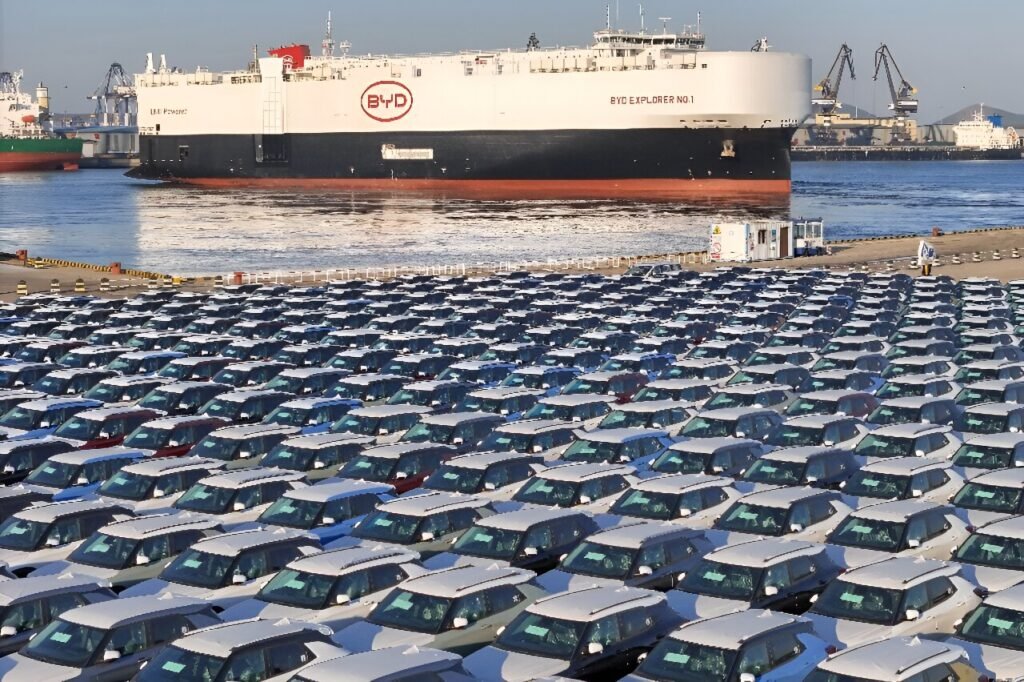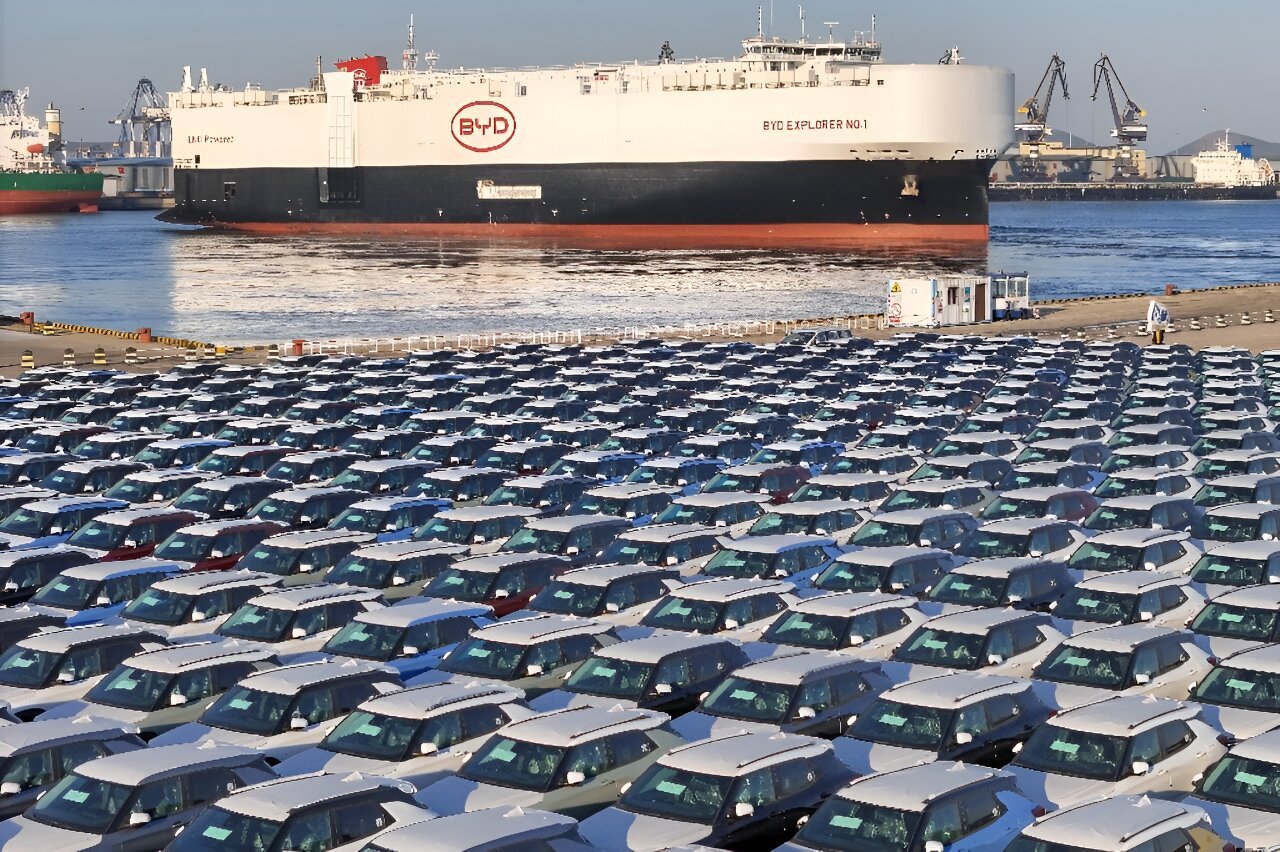Policymakers in Brussels, Washington, and other regions are working to limit China’s automotive aspirations due to escalating trade tensions and concerns about an influx of Chinese vehicles saturating international markets.
On Wednesday, the European Union announced its decision to impose additional tariffs of up to 38% on electric vehicles imported from China. E.U. leaders described this measure as an effort to shield the region’s manufacturers from unfair competition.

This decision follows President Biden’s recent move to quadruple U.S. tariffs on Chinese electric vehicles to 100%, intensifying trade tensions with China amid concerns about an oversupply of Chinese green technology in global markets.
These actions by the European Union and the United States highlight the difficulties faced by traditional automakers in both regions. They are now contending with emerging Chinese companies focused on electric vehicles, which operate with significantly lower costs.
However, unlike American automakers, many European car manufacturers have significant ties to the Chinese market. Their vehicles produced in China will also be subject to these higher tariffs. European carmakers have expressed concerns that the increased duties, up from the current 10%, might provoke retaliation from China, lead to higher prices, and decrease demand for electric cars.
The newly announced tariffs, which are set to take effect on July 4, range from 17.4% to 38.1% for three major Chinese manufacturers: BYD, Geely, and SAIC. These rates were determined based on the extent of their cooperation with European officials, who have been investigating the level of Chinese government support for these companies over the past few months.
Other automakers producing electric vehicles in China, including European companies with Chinese factories or joint ventures, will face tariffs of either 21% or 38.1%, depending on their level of cooperation with the investigation, according to the E.U.
The European Union justified its actions by stating that an investigation, which began on October 4, revealed that China’s electric vehicle supply chain significantly benefits from unfair subsidies. This influx of subsidized Chinese imports at artificially low prices threatens to cause foreseeable and imminent harm to the EU industry.
In response, He Yadong, a spokesman for China’s commerce ministry, criticized the tariffs, claiming they lacked a “factual and legal basis” and accused the EU of “weaponizing economic and trade issues.” He also noted that the tariffs contradict the consensus between Chinese and European leaders to enhance cooperation, potentially harming the bilateral economic and trade relationship.
The European Commission, the EU’s executive branch, initiated the investigation to ascertain whether the Chinese government was effectively subsidizing electric car production and exporting them to Europe at prices that undercut local manufacturers.
European Union Hits E.V.s From China With Extra Tariffs Up to 38%
The automotive sector is crucial for the EU, providing nearly 13 million jobs across its 27 member states, making it the world’s second-largest market for electric vehicles after China. Imports of electric cars from China surged to $11.5 billion last year, a significant increase from $1.6 billion in 2020. Currently, about 37% of all electric vehicles imported to Europe come from China, including those from Tesla, BMW, and Dacia, owned by Renault. Chinese brands now hold 19% of the European EV market, a number that continues to grow according to a Rhodium Group study.
Senior EU officials emphasized that Europe remains open to dialogue with Chinese authorities to resolve the issue, asserting that the EU’s goal is not to impose higher tariffs but to protect its domestic industry.
E.U. Hits Electric Vehicles From China With Higher Tariffs
Tesla, which manufactures its Model 3 and Model Y in Shanghai for the European market, requested that tariffs on its vehicles be calculated individually. EU officials noted that other companies have nine months to submit similar petitions, although none had done so by the time of the announcement on Wednesday.
Ursula von der Leyen, the president of the European Commission, stated last month that Europe was adopting a “tailored approach” to calculating its tariff increases from the current 10 percent, ensuring they reflect the “level of damage” caused. Tariffs for other exporting companies will be based on the weighted average of the duties imposed on the three companies that were investigated.
Before this announcement, China had cautioned that it might retaliate by increasing tariffs on gas-powered cars imported from Europe, as well as on agricultural and aviation products. Currently, China imposes a 15 percent duty on all electric vehicles imported from Europe, including those made by BMW and Volkswagen. These companies not only sell to China but also have significant production facilities there.
European Union Hits E.V.s From China With Extra Tariffs
German carmakers fear that these tariffs will raise prices in Europe and provoke Chinese retaliation, ultimately harming them in both markets. Chancellor Olaf Scholz of Germany criticized the increased duties last week during his visit to a plant in Rüsselsheim, owned by Stellantis’s Opel.
“Isolation and illegal customs barriers — that ultimately just makes everything more expensive, and everyone poorer,” Scholz said. “We do not close our markets to foreign companies, because we do not want that for our companies either.”
Economic experts had warned that raising tariffs to as high as 20 percent could disrupt trade routes. The Kiel Institute for the World Economy calculated that such an increase would prevent $3.8 billion worth of Chinese electric vehicles from entering Europe.
However, other experts argue that Chinese manufacturers’ cost advantage over Europe’s legacy automakers in producing components like electronic modules and battery cells means Europe would need to impose duties of at least 50 percent to be effective. Even if European automakers could bridge this gap, a reduction in Chinese models would drive up the overall price of electric vehicles due to higher labor and production costs, according to the institute.
“It is by no means certain that European car manufacturers will fill the gap,” said Julian Hinz, a trade researcher at the institute. He noted that a significant challenge for European producers is that Chinese manufacturers are already planning to expand their production into Europe.
BYD, the leading Chinese automaker, aims to become a top electric vehicle maker in Europe by 2030. Late last year, the company chose Hungary as the location for its first assembly plant in the European Union. Additionally, BYD is considering opening a second factory in another European country.
Chery, another Chinese automaker, announced last month that it would open a plant near Barcelona in a joint venture with Spain’s EV Motors.
Several European countries are keen to have Chinese automakers establish operations on their soil, hoping this would create jobs and strengthen domestic supply chains.
French President Emmanuel Macron has made significant efforts to attract more battery production, including from Chinese companies, to the northern region of France, where factory jobs have been declining. France’s finance minister, Bruno Le Maire, has gone even further, stating that the Chinese auto industry is “very welcome in France.”
E.U. Hits Electric Vehicles From China With Higher Tariffs
In light of Chinese firms potentially expanding in Europe, many European automakers emphasize that they are more focused on improving their competitiveness than worrying about tariffs.
Volkswagen, which has multiple production and research sites in China, expressed concern about the tariffs, viewing them as detrimental, especially as demand for electric cars in Europe is decreasing.
“The increase in import tariffs in the E.U. could trigger a harmful cycle of measures and countermeasures, leading to an escalation of trade conflicts,” the company said in a statement on Wednesday. “We believe that the negative effects of the decision will outweigh any positive aspects.”
E.U. Hits Electric Vehicles From China With Higher Tariffs
The tariffs are expected to take effect early next month. Affected companies and the Chinese government will then have several days to provide their input. The commission has until November to make a final decision on the tariffs, which would be enforced for five years.
